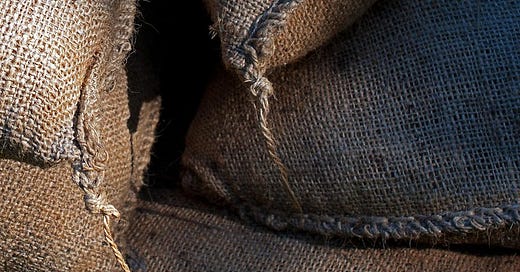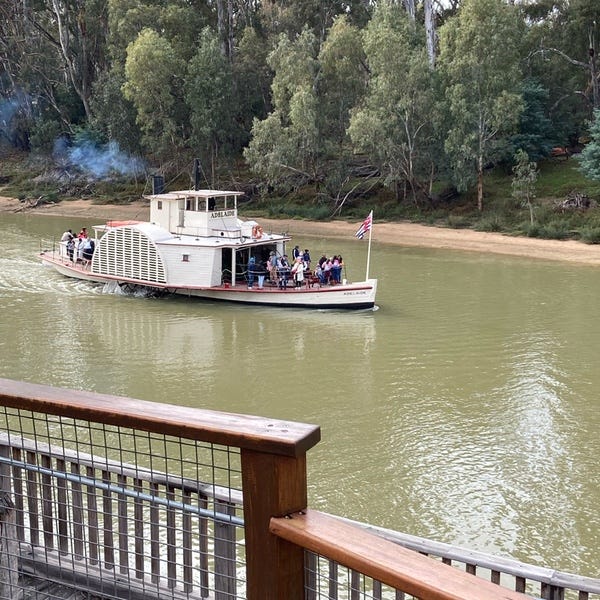In this episode, we explore what a responsibility-based economy looks like in real-world practice
If there’s one symbol of what’s happening right now all along the mid-range of Australia’s flood-laden Murray River, it would be the humble sandbag:
To give some idea of the scale of the problem that’s being faced in Murray River towns such as Echuca and Kerang, here’s a photograph I took last year, standing at the top of the steps leading down to the riverboat-station at Echuca:
Right now, as I write this, the river is expected to peak somewhere between the two sets of railings in front of me - that’s something like forty feet higher than its regular level. And if the rains coming our way this week are as intense as predicted, the water-level could be even higher than that.
True, it’s happened before - but the last time it did so was way back in the 1850s. And these supposedly ‘thousand-year floods’ are becoming steadily more common: down in the now-ruined township of Rochester, some twenty miles or so further upstream on the Campaspe river that flows into the Murray at Echuca, the previous worst flood was fifty years ago, but the next one barely ten.
It’s not looking good…
What is looking good is the way that people have responded to the challenge. A literal expression of ‘response-ability’, in fact. In essence, there are just three tasks happening, all throughout these towns right now: get your own house ready for the flood; then once your own house is done, or if you’re living above the flood-risk level, help others get ready for the flood; or help the helpers, with food, supplies, evacuations, transport, or whatever else might be needed.
Teams of teenagers working their way down a line of streets, helping people move their furniture, valuables, clothes and children’s toys to higher levels in at-risk houses; as soon as each house is done, move on to the next, and the next, and the next. One hundred and fifty thousand sandbags to fill, to move, to place in position. Everyone, from able-bodied adults to schoolkids. No-one’s telling them to do it, that they ‘should’ do it: they just do it, because it needs doing. A local heavy-trucking company turning up with a constant stream of tipper-tucks, right the way through the night, bringing thousands of tons of clay from their own reserves to build a levee in front of the town. Someone turned up from Sydney, six hundred miles away, with an excavator on the back of a trailer. Another company brought in a bulldozer to push the soil and sandbags into place. My favourite cafe in that town keeping a constant flow of coffee to anyone who needed it; the Sikhs from the city turning with their food-trucks, as they so often do at these times.
And no money changing hands, for any of this. It’s a literal responsibility-based economy.
Oh, sure, it’s not perfect, by any means. There are still a lot of people on the far side of the river whose homes can’t be protected by the levee, and they’re understandably unhappy about that. And yet these are the bleak choices that Reality Department will sometimes impose, whether we like it or not: we have to work with those harsh facts, rather than blame others for issues that were never in their control in the first place. There are fair ways to resolve the losses afterwards: but it needs to be tackled via a respectful responsibility-based approach - whereas the usual ‘winners-and-losers’ model of the possession-economy will only ever make things worse.
And yes, even here, the possession-economy still rears its ugly head from time to time, of course. One elderly woman’s home was stripped of its sandbag protection in the middle of the night, by someone who couldn’t be bothered to go to the effort of filling up their own. Further south, in Melbourne, where the floods have already subsided, looters were spotted breaking into mud-wrecked houses, looking for anything that they could steal. But in this place, this time, those behaviours are the exception - not the near-norm that they are in our current everyday of a petty, parasitic, paediarchal possession-economy.
And the reason why the possession-economy must be kept at bay here is that, in this brief gap for turning the tide before the flood bears down upon the town, there’s simply no time or energy available to waste on its childish inanities.
That’s always been the blunt fact here: money doesn’t make the world go round - it mostly makes it stop. And most often just at the point where we most need things to keep going as best we can…
One way or another, a possession-based economy will always make things worse. It can’t do otherwise, because that’s actually inherent in its very nature. By contrast, as we can see so well in this real-world example, a responsibility-based economy is the only way that works - especially when we’re up against the otherwise-unstoppable tides of the world.
And that’s the lesson we perhaps most need to learn right now, in this brief moment that we have for preparation, whilst those vast tides of ever-greater change loom closer everywhere across our world with every passing day.





This is an excellent read, Tom!
Men will not part away even from a smallest fraction of smallest cryptocurrency (coin) though he got through referrals is mentioned in Vishnu-Puran (http://marker.to/6KRS2y) in this age of Kali. What he meant is they will be so possessive as you have mentioned in your article.
Maharshi Vyasa has given solution is simple that is by chanting of name of God will bring them back to life: I had written article earlier on that. https://ventpipe.blog/2022/06/13/excellent-excellent-is-the-kali-age/.
That's the best part of Kali age he says as told here http://marker.to/kZReWU. (Book 6 - Chapter II)
Then Maharshi Vyasa talks nothing beyond that other than how dissolution happens (Book 6 - Chapter III): https://www.sacred-texts.com/hin/vp/vp158.htm. I don't know what he was hinting...